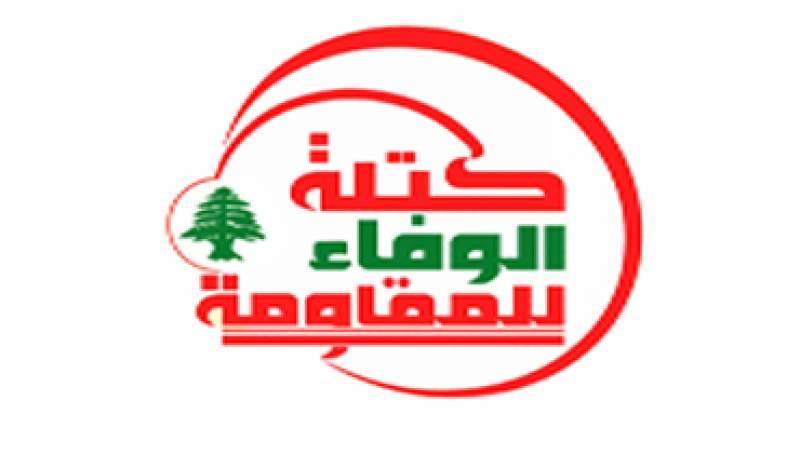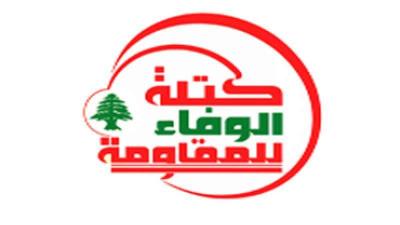The "Loyalty to the Resistance" bloc announced in a statement, after its regular meeting at its headquarters, chaired by MP Mohammad Raad and attended by its members, that "the presidential crisis in Lebanon continues to linger without any significant progress to rely on for pulling the country out of its plight, as demonstrated by the collapse of state institutions under the weight of ongoing imbalances and issues affecting the banking, economic, health, and educational structures, extending to the structures of authority and its judicial, security, and military apparatuses."
It pointed out that "with the multitude of bets and their dispersion and the intensification of directed pressures, whether through unilateral and vindictive sanctions or through imposing policies that increase the burdens on the country, such as in the case of the Syrian displaced people, or by making decisions that constitute overt and condemned interference in Lebanon's internal affairs, the national duty requires a rescue understanding that leads to filling the presidential vacancy and restoring the general order conducive to authority and its institutions and apparatuses, in addition to restoring normal life to community sectors and their vital facilities."
It stated: "Every September, we are reminded of the national pride manifested in the heroic confrontation against the Zionist enemy in Jabal al-Rafee' where the blood of the Resistance heroes and the Lebanese army, supported by our proud people, inscribed the equation of perpetual victory, where martyrs Hadi Nasrallah, Ali Kothrani, and Haytham Mougniyeh, along with Captain Jowad Azar, marked their names in the list of its symbols. Following this is the scene of the handshake in Oslo, which our nation rejected, as our people in Lebanon, throughout their peaceful journey, offered the dearest blood shed by authoritarian rulers unjustly and aggressively, without being able to mold the consciousness of the people or instill defeatism and concession."
It added: "The third scene is one of disgrace, shame, crime, and collaboration, executed by gangs and militias allied with the Zionist enemy, in which the souls of nearly 4,000 Lebanese and Palestinian martyrs, including women, children, men, and the elderly, were violated in Sabra and Shatila during the Zionist invasion and occupation of Beirut in 1982. This occupation did not save Lebanon and the Lebanese from its dangers and consequences, except for the valiant Resistance that forced the Zionists and their collaborators into defeat and retreat on May 25, 2000."
It continued: "While we honor the first scene of pride in Jabal al-Rafee', we condemn the detestable Oslo Accord and reaffirm our condemnation of the militias of murder and racist crime for the atrocities they committed that darken the pages of human history in the Sabra and Shatila massacre."
It confirmed "its commitment, in addressing the presidential entitlement, to always fortify Lebanon, its state, and its society against hostile political projects aimed at weakening our country's ability to protect its vital security and economic interests and preventing its subjugation to the influence of forces seeking to impose normalization of relations with the Zionist entity and what it represents of illegal occupation and a constant threat to the security and stability of the region."
The bloc renewed "its call to all Lebanese parties concerned with national sovereignty to prioritize the supreme national interest over narrow factional interests in addressing the required presidential entitlement, and to be mindful that the solutions arising from national understanding or consensus are more important and secure for the country, especially in times of systemic and continuous targeting."
It also stressed "the necessity for the government to fulfill its duty and provide everything necessary, despite the current crisis, to ensure the operation of public and vocational education for this academic year, whether by empowering and supporting teachers, or by addressing deficiencies and needs that could disrupt the educational process and its regularity if neglected."
It renewed its call to "draw up a realistic government policy to handle the displaced persons' issue in a way that does not turn it into a tool of extortion against Lebanon or pressure it to accept hostile projects targeting its sovereignty and the dignity of its people." It warned of "the dangers of the measures taken by the High Commissioner for Refugees in Lebanon regarding the Syrian displaced file under the pretext of organizing their displacement," urging "the government to be steadfast in monitoring these procedures."




